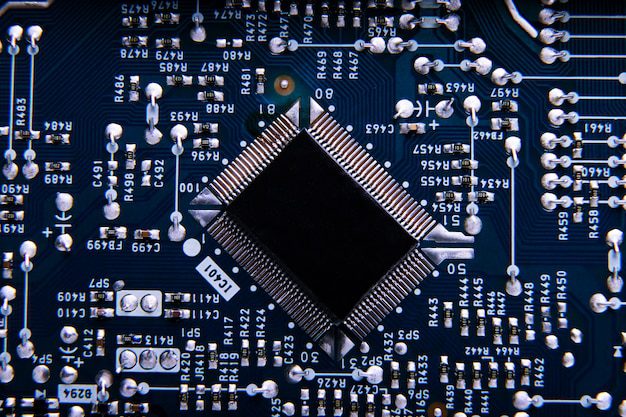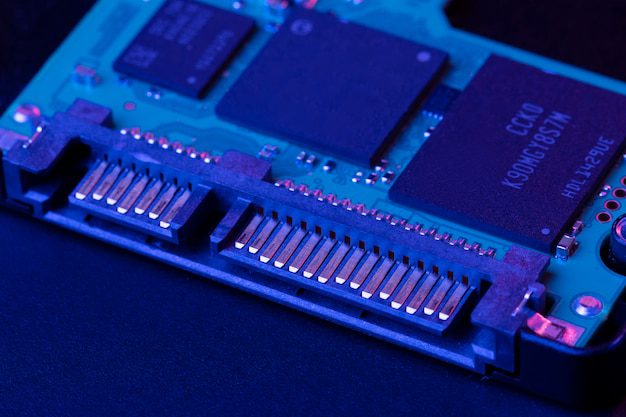Who Makes the Chips for Apple?
In today’s interconnected world, where technology drives innovation and change, Apple is at the forefront of producing cutting-edge devices that capture the imagination of consumers. From iPhones to iPads, Apple products have become an integral part of our daily lives. But have you ever wondered who makes the chips that power these devices?
The answer lies in a partnership between Apple and one of the leading chip manufacturers in the world: Taiwan Semiconductor Manufacturing Company (TSMC). TSMC is a key player in the semiconductor industry, specializing in manufacturing advanced chips used in various electronic devices.
The Collaboration between Apple and TSMC
Apple and TSMC have been working together for many years to design and produce the chips that power Apple’s devices. TSMC manufactures the chips based on Apple’s specifications, ensuring they meet the company’s high standards for performance, efficiency, and reliability.
This collaboration allows Apple to maintain a competitive edge by having chips specifically tailored to their devices, giving them greater control over the performance and features of their products. By partnering with TSMC, Apple can leverage TSMC’s expertise in semiconductor manufacturing and take advantage of their state-of-the-art facilities.
The Importance of Chip Technology
Chips are the heart and brains of any electronic device, including smartphones, tablets, and computers. They are responsible for executing instructions and performing calculations, enabling the device to function smoothly and efficiently. As technology advances, the demand for more powerful and energy-efficient chips continues to grow.
Apple, known for its commitment to delivering high-performance and user-friendly devices, recognizes the importance of chip technology in achieving these goals. By collaborating with TSMC, they can stay at the forefront of chip technology and ensure their devices are equipped with the latest advancements.
TSMC’s Expertise and Manufacturing Process
TSMC has established itself as a leader in semiconductor manufacturing through its constant innovation and investment in research and development. The company utilizes a state-of-the-art manufacturing process, known as the FinFET process, which allows for smaller, faster, and more efficient chips.
Through TSMC’s expertise, Apple can design chips that deliver exceptional performance while minimizing power consumption, resulting in longer battery life and improved overall user experience. This collaborative effort between Apple and TSMC enables them to push the boundaries of what is possible in terms of chip technology.
The Impact on Consumers
Ultimately, the collaboration between Apple and TSMC benefits consumers by providing them with devices that offer superior performance and efficiency. The chips produced by TSMC enable Apple to deliver on its promise of creating innovative and user-friendly products.
Whether it’s capturing stunning photos with advanced image signal processing or enjoying immersive gaming experiences with powerful graphics capabilities, the chips made by TSMC play a crucial role in enhancing the overall functionality and user experience of Apple devices.
“The partnership between Apple and TSMC is essential for driving innovation and delivering groundbreaking devices that exceed consumer expectations.” – Apple spokesperson
In conclusion, when it comes to who makes the chips for Apple, the answer is TSMC. Through their collaboration, Apple can harness TSMC’s expertise in semiconductor manufacturing to produce chips that power their devices, setting new standards in performance and efficiency. As technology continues to advance, this partnership will undoubtedly play a pivotal role in shaping the future of Apple’s products.
Who Makes Qualcomm Chips?
Introduction
Qualcomm chips are widely used in smartphones, tablets, and other electronic devices. These chips are known for their high performance, efficiency, and advanced features. But have you ever wondered who actually makes Qualcomm chips? In this article, we will explore the companies behind Qualcomm’s chip manufacturing and delve into their partnerships and collaborations.
Taiwan Semiconductor Manufacturing Company (TSMC)
The main company responsible for manufacturing Qualcomm chips is the Taiwan Semiconductor Manufacturing Company (TSMC). TSMC is renowned for its semiconductor fabrication expertise and state-of-the-art facilities. They specialize in manufacturing advanced chips for various industries including mobile devices.
Partnerships and Collaborations
TSMC has been a long-standing partner of Qualcomm and manufactures most of the Snapdragon processors found in Qualcomm’s chips. Additionally, TSMC collaborates with Qualcomm on the development of new technologies and manufacturing processes to enhance chip performance and power efficiency.
Another key player in Qualcomm chip manufacturing is Samsung Foundry. Samsung Foundry also produces Snapdragon processors for Qualcomm using their advanced fabrication processes and technologies. This partnership ensures a steady supply of Qualcomm chips to meet the growing demand.
Other Global Manufacturers
Aside from TSMC and Samsung Foundry, there are other global manufacturers involved in Qualcomm chip production. These manufacturers include companies like GlobalFoundries and SMIC, which play a significant role in manufacturing Qualcomm chips for different markets worldwide.
Who is Qualcomm owned by?
The Ownership Structure of Qualcomm
Qualcomm, a global leader in wireless technology and telecommunications, operates under a complex ownership structure. Many individuals and institutional investors own shares in the company, but there are also significant holdings from key stakeholders. Let’s take a closer look at who owns Qualcomm.
Key Shareholders of Qualcomm
The largest shareholder of Qualcomm is The Vanguard Group, a leading investment management firm that holds around 8% of the company’s outstanding shares. BlackRock, another prominent asset management company, is also a major investor with a stake of nearly 7%. Other notable shareholders include Fidelity Investments, State Street Corporation, and T. Rowe Price Associates.
Qualcomm’s Founders
Founded in 1985, Qualcomm was established by Irwin Jacobs, Andrew Viterbi, Harvey White, Franklin Antonio, and Adelia Coffman. While the founders originally held substantial ownership in the company, their ownership stakes have since reduced over time due to various factors, including stock dilution and selling of shares.
Ownership Changes and Acquisitions
Over the years, Qualcomm has undergone several ownership changes and acquisitions. One noteworthy transaction occurred in 2018 when Broadcom attempted to acquire Qualcomm in a hostile takeover bid. However, the acquisition was prevented by a U.S. presidential order on national security grounds.
Quotes about Qualcomm’s Ownership
“Qualcomm’s ownership is diverse, with a mix of institutional investors and individual shareholders.” – Financial Analyst
“While the founders no longer hold major stakes, their contributions to the company remain significant.” – Tech Industry Expert
Who makes processors for Samsung?
When it comes to smartphones, Samsung is one of the leading brands globally. Known for their high-quality devices, Samsung relies on advanced technology and powerful processors to deliver exceptional performance to its users. But who exactly manufactures these processors for Samsung? Let’s take a closer look.
Samsung’s In-House Exynos Processors
Samsung primarily uses its in-house developed Exynos processors in many of its smartphones. These processors are designed and manufactured by Samsung Electronics, a subsidiary of the Samsung Group. The Exynos processors are known for their cutting-edge technology and excellent performance.
Collaboration with Qualcomm
In addition to their in-house processors, Samsung also collaborates with Qualcomm, a leading semiconductor and telecommunications equipment company. Qualcomm manufactures their Snapdragon processors, which are used in some Samsung devices. These processors offer top-tier performance, power efficiency, and advanced features.
Other Chipset Suppliers
Besides Samsung and Qualcomm, there are other semiconductor companies that supply processors for Samsung smartphones. Some of these suppliers include MediaTek, a Taiwanese company known for its affordable yet efficient processors, and Huawei’s HiSilicon Technologies, which designs and manufactures chips primarily for Huawei devices.
Furthermore, Samsung has been increasing its reliance on their own processors, aiming to reduce dependence on external suppliers. This strategy allows them more control over the design and optimization of their devices, resulting in improved performance and integration.
“Samsung’s Exynos processors and collaborations with Qualcomm ensure the brand delivers powerful and efficient hardware to its users.”
Overall, Samsung’s processors are a result of their in-house research and development, as well as partnerships with established semiconductor manufacturers. This approach enables Samsung to produce smartphones with exceptional performance and efficiency, cementing their position as a leading player in the global smartphone market.
Conclusion
Qualcomm chips, known for their technological prowess, are primarily manufactured by Taiwan Semiconductor Manufacturing Company (TSMC) and Samsung Foundry. These companies collaborate with Qualcomm to produce advanced Snapdragon processors for various electronic devices. Alongside TSMC and Samsung Foundry, other global manufacturers also contribute to Qualcomm chip production, ensuring a reliable supply of chips for the ever-growing tech market.
With these strong partnerships and collaborations, Qualcomm can continue to innovate and deliver cutting-edge chip technology that powers our devices, making them faster, more efficient, and capable of handling the demands of modern-day technology.
Qualcomm’s ownership is spread across a broad range of shareholders, including institutional investors and individuals. Although the founders no longer have major ownership stakes, their impact on the company’s success cannot be overlooked. As Qualcomm continues to innovate and shape the wireless technology landscape, its ownership structure remains a key aspect of its corporate identity.



